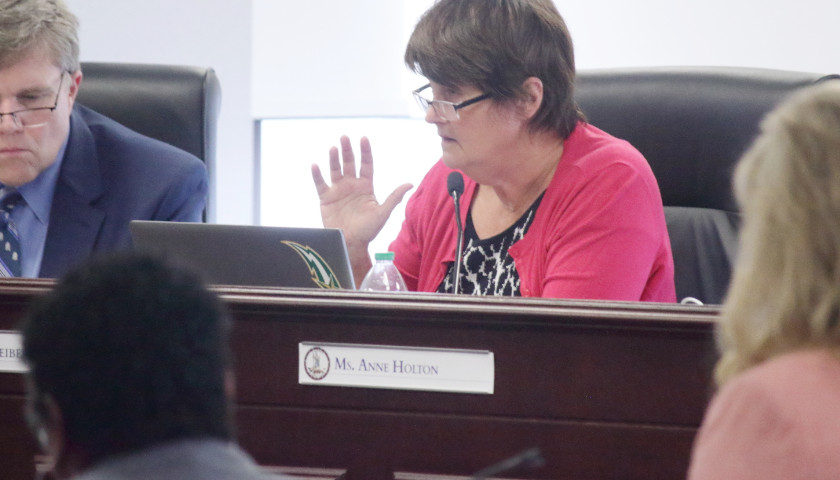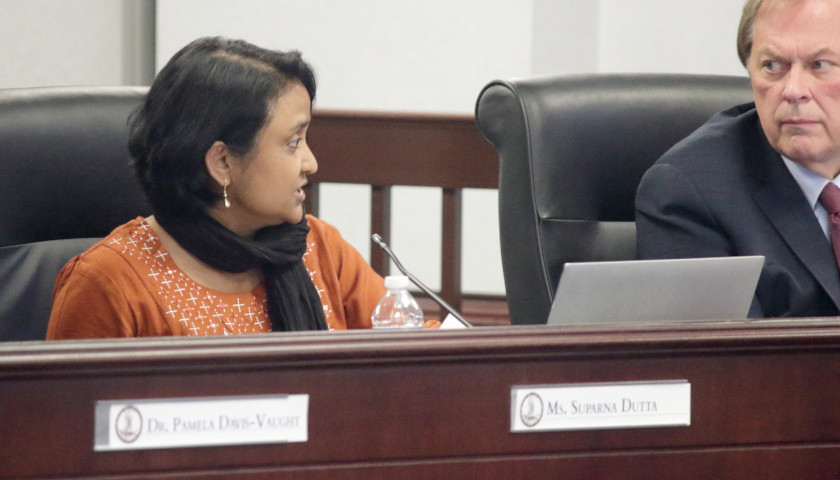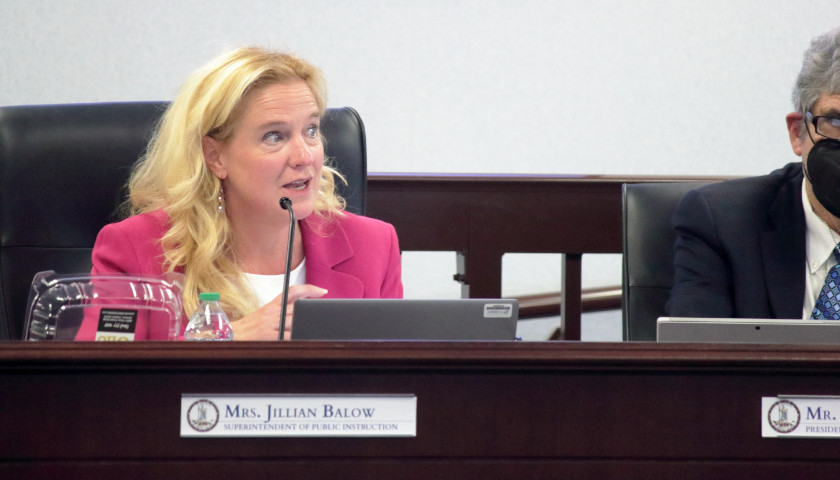RICHMOND, Virginia – Superintendent of Public Instruction Jillian Balow said the Virginia Department of Education (VDOE) needs more time to prepare updated drafts for review of new History and Social Sciences Standards of Learning and accompanying curriculum frameworks. That’s another delay in approval and implementation of the standards after Balow first asked for more time in August.
“Since the September Board meeting, new board members have raised important concerns and questions about the draft standards. Additionally, we sought reviews by individuals and entities, whose voices had not yet been heard. Meanwhile, VDOE staff has worked diligently, to correct errors, remove repetition, reorder guidance, and edit language so that parents, educators, and students can understand and use the standards document,” Balow said in a Monday memo to the board.
 On Thursday, Balow told the board of education that her new timeline, which delays the board’s first review of the standards until November, with final adoption in February, was “under-promising” in the hope of completing the work faster. The timeline also calls for separating out the frameworks to a slightly more delayed timeline that might not see adoption until August. The frameworks are more-detailed guides to help schools develop curricula that comply with the high-level standards. School districts will need both the standards and the frameworks in time to prepare for the 2023-2024 school year.
On Thursday, Balow told the board of education that her new timeline, which delays the board’s first review of the standards until November, with final adoption in February, was “under-promising” in the hope of completing the work faster. The timeline also calls for separating out the frameworks to a slightly more delayed timeline that might not see adoption until August. The frameworks are more-detailed guides to help schools develop curricula that comply with the high-level standards. School districts will need both the standards and the frameworks in time to prepare for the 2023-2024 school year.
Review and updating of the history and social sciences standards first began under former Governor Ralph Northam’s administration, but Governor Glenn Youngkin’s administration asked for more time before presenting the drafts to the board for first review. The standards are contentious, as Republicans fear that Northam’s administration bundled ideological changes into the standards, and Democrats now fear that Youngkin’s administration is trying to bundle opposing ideological changes into the standards.
When Balow first asked for the delay in August, some board members expressed concern on falling behind on the timeline; the standards are required by law to be reviewed in a seven-year cycle. In the August meeting, Balow said the draft had technical problems including the accidental omission of wording calling George Washington “the father of our country.”
At the time, Youngkin told reporters, “One of the reasons why I was so supportive of delaying the progressing of our history review in the Commonwealth is that we have to just get past this idea that everyone was perfect. They were imperfect, but they were also our founding fathers.”
On Thursday, Balow said that she wanted to use the time to incorporate feedback from organizations that hadn’t been asked for comment under the previous administration, listing the Jack Miller Center, Hillsdale College, American University, Fordham Institute, University of Virginia and Baylor University political scientists, and museums.
“The truth of the matter is that the timeline is just not as important as the content and making sure that we get it all right. And so that is what I’m focused on. I’m focused on the voices that, had I been here prior to [2022] would have been brought to the table as well,” she said.
 VDOE Director of Communications Charles Pyle told The Virginia Star that in the previous review cycle, the standards weren’t adopted until January 2016, seven years and three months after the previous standards were adopted. He said that even under the new timeline proposed by Balow, the standards would still be adopted in March 2023 – seven years and three months after the standards were adopted in 2016.
VDOE Director of Communications Charles Pyle told The Virginia Star that in the previous review cycle, the standards weren’t adopted until January 2016, seven years and three months after the previous standards were adopted. He said that even under the new timeline proposed by Balow, the standards would still be adopted in March 2023 – seven years and three months after the standards were adopted in 2016.
In Thursday’s meeting, board member Anne Holton, a McAuliffe and Northam appointee, asked Balow about the need for the delay. Her concerns were echoed by some other members of the board, with some worrying that the delay would contribute to a lack of transparency and eroded public trust. Some Youngkin appointees backed the delay. Member Suparna Dutta expressed concern over an inquiry-based approach in the existing standards draft. Member Bill Hansen echoed that concern, and noted that under the new timeline, the standards would still be completed in time for the 2023-2024 school year.
Other members expressed concern over the expansion in scope from technical edits to a broader review and a shift in the process, and that they hadn’t seen what changes were being made since August.
Holton opposed the change to separate the standards of learning from the curriculum frameworks and defended the existing draft.
“It is not slanted in any direction. It has gotten, to me, a very, very good take on the very difficult challenge of balancing depth and breadth,” she said.
She also questioned the voices that Balow wanted to include.
“I don’t understand who are the voices that want to weigh in on this that haven’t been paying enough attention to have weighed in by now. Everybody who wanted to saw this draft produced back in late June and has had ample opportunity to weigh in,” she said. “I’ve heard it said that there are conservative voices that haven’t had an opportunity to weigh in. I heard Superintendent Balow today refer to Hillsdale College. Just for the record, Hillsdale College is a private, evangelical – frankly, in my opinion, extremist school in Michigan.”
Hansen seemed to dispute Holton’s characterization.
Holton said, “My point is, if Hillsdale College wants to weigh in, they could have weighed in by September 25, they could have weighed in in July, they could weigh in right now and submit line-by-line suggested edits that the staff could then review. But the suggestion that we now need potentially 10 months to get to the endpoint on this …”
Youngkin appointee Member Andy Rotherham said he shared Holton’s concerns about the process coming in “dribs and drabs” and the public perception caused by that. He called for the department to commit to a hard date, preferably sooner than August. He also addressed the ideological concerns.
“The governor stood right over here a couple of meetings ago, and he said this repeatedly: he wants honest history, he wants to teach the good and the bad, and where America has succeeded and the progress, where America’s fallen short. And I just think at the end of the day, again, it’s a public process. The document will be out there,” he said.
Rotherham said, “People can draw their own conclusions about whether or not we lived up to that, but at this point, I feel like, if he wants us to have the best standards that are really actually honest history, particularly in this context of where some states are doing stuff that I think people are rightly concerned about, that’s a chance for us to be a national model. I just think we should take yes for an answer and try to get this right.”
– – –
Eric Burk is a reporter at The Virginia Star and The Star News Network. Email tips to [email protected].
Photos by Eric Burk.





[…] the administration was reaching out to more organizations for comment on the new standards. In a Board of Education meeting last week, some board members hinted at concerns that Youngkin’s administration was working on […]